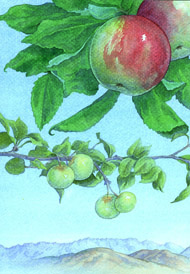As I was approaching forty, mid-life crisis reared up in my path like a brick wall and I crashed and burned. The feeling that I remember most from that time was the devastating sense of hopelessness and fear that pervaded all things and in the end all I could do was surrender to this and grieve my way through. Now, ten years later my life has changed beyond recognition and I feel more at home in myself than I have ever done.
Mid-life taught me many lessons, not least that on the path to self-fulfilment there is usually a dark harvest first. Certainly in times of transition such as mid-life, it is the dark and bitter fruit of our lives that we must face before we can come to a place of peace and acceptance within ourselves. Here in the dark harvest we learn about our mistakes, our frailties, our ego and the illusions that bewitch and betray it.
This is true too in the cycle of the year. Now, in August, as we begin to harvest the fruit of our practical and emotional endeavours throughout the year so far, it is often the dark harvest that we feel first. This is the gathering of the years shadow together under one wing to be felt once again. Just as the wild vines of the forest wrap and tangle around all of the trees, binding all together, so the dark harvest embraces elements of all that we have passed through so far. We find ourselves revisiting emotional dead lands that we thought we had left behind.
It is tempting to think of climate change as a sort of mid-life crisis for human kind, not least because that idea suggests that we have something to look forward to afterwards. Certainly it cultivates an all pervading sense of hopelessness and fear. Like mid-life it promises to be a painful transition, a breaking down of the caterpillar in the cocoon so that the butterfly can emerge. It helps to have a guiding vision in this time of unknowing.
The tree of harvest for the Celts here in the British Isles was the apple, a tree of love, abundance and healing. In myth apples often speak to us of choice, consequence and destiny. One of my favourite apple stories is the Firebird, in which a young prince sets out on a quest to capture the bird that is stealing the golden apples from his father's tree. He is guided by a wolf, his teacher and pathfinder, yet time and time again he chooses to ignore the wolf's advice and gets himself into deeper and deeper trouble. He is sent again and again to steal a magical creature and each time the wolf tells him to take the creature but not to touch its golden trappings. Each time he cannot resist and has to pay the consequences.
This story tells us much about our choices and their consequences. When we are tempted again and again by life's trappings it is decline that we are choosing because these things are material, transient and passing. These golden trappings serve only to trap life, to restrain and cage it and they represent the fearful need to cling to and control that which is inherently flowing and changeable. Because they only sustain us for a while the grasping becomes addictive and we are never truly satisfied. So we are condemned to go on quest after quest, seeking greater and more elusive treasures, stealing the riches from the world yet harvesting only disappointment. But when we choose life it is beauty and abundance that we are choosing because life is eternal, creating itself out of itself forever. Life is wild and spontaneous, passionate and vital. Reaching only for those things that truly nourish, sustain and enliven us, we harvest life itself.
This choice is presented to us every moment of our lives. Choosing life means living simply, enjoying simple, heartful pleasures. There is a guiding voice within each of us that, just like Ivan's wolf, knows exactly what we need and what we don't. We just have to take time to listen.
This choice has global consequences too. It is the relentless quest for the trappings that leads us to plunder and pollute our world. Yet the real pleasures in life such as love, reverence, friendship, sharing, and celebration take nothing from the planet. They give life back to itself and without them all the trappings in the world are meaningless. Working through the dark harvest allows us to burn away the chaff and leave the good grain that will feed us and plant the fields of our future. Its fruits may be bitter but they hold within the seeds of hope and transformation.
This article continues the themes explored in Unlocking the Grief by Ian Siddons Heginworth. Read the original article here








